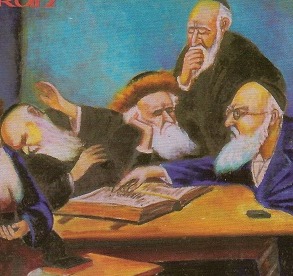 How much can we really learn about the Jewishness of Jesus from Jewish sources? That’s a pretty fundamental question, since the goal of this website is to understand the Jewish background of Christianity. I’ve found some pretty important news about it, and wanted to share it here.
How much can we really learn about the Jewishness of Jesus from Jewish sources? That’s a pretty fundamental question, since the goal of this website is to understand the Jewish background of Christianity. I’ve found some pretty important news about it, and wanted to share it here.
A common approach to studying Jesus is to use two major Jewish sources that are from slightly after his time.* The Mishnah is a record of the oral debates and decisions of the rabbinic teachers that was written down around 200 AD, but supposedly preserves sayings back to 200 BC. The Talmud (in two editions) contains the Mishnah along with an expansive commentary that was published between 200-300 years later.
Many who write about Jesus’ Jewish context quote the Mishnah and the Talmud extensively. Their assumption is that oral traditions from Jesus’ day were very long lived, and that even though they were written down later, they are still useful.
Others have protested because the documents came along after Jesus’ time. Can they be used? In the 1960s and for a couple decades afterward, the answer of many scholars was a resounding “no.” This was especially the feeling in the mid 1970’s, when a well known scholar, Jacob Neusner, put forth the theory that Judaism completely reinvented itself after the destruction of the Temple in 70 AD.
Neusner suggested that everything written in the Mishnah was very late—all the quotes from rabbinic teachers who were supposed to have lived before the time of Jesus, like Hillel and Shammai, were fabricated later. Any scholar who tried to publish something that compared Jesus to other Jewish teachers was laughed out the door.
But in the past decades more and more research has been done to ask the question, how trustworthy is the Mishnah? Can it tell us about Jesus’ time period? And more and more are saying that with care, it actually is.
In fact, Neusner himself is one of the researchers who says so. Some parts seem to be very early and very reliable, and some things appear to be added or edited later. For instance, moral tales about the rabbis contain some fanciful elaborations, but sayings attributed to them are thought to be fairly reliable. Since we know when rabbinic teachers lived, we can determine the date of a saying.
 This can be really interesting. For instance, one saying that you might have heard is, “Let your house be a meeting place for the sages, cover yourself with the dust of their feet, and drink in their words thirstily.” (Mishnah, Pirke Avot 1:4.) It’s attributed to a sage named Yose ben Yoezer, who lived about 200 years before Jesus’ time. If you’ve ever heard Ray Vander Laan or Rob Bell talk about “walking in your rabbi’s dust,” this is where that line comes from. (See this article for more.) It describes the tradition of teachers wandering the land, staying in people’s homes, and having disciples follow after them and sit at their feet when they taught.
This can be really interesting. For instance, one saying that you might have heard is, “Let your house be a meeting place for the sages, cover yourself with the dust of their feet, and drink in their words thirstily.” (Mishnah, Pirke Avot 1:4.) It’s attributed to a sage named Yose ben Yoezer, who lived about 200 years before Jesus’ time. If you’ve ever heard Ray Vander Laan or Rob Bell talk about “walking in your rabbi’s dust,” this is where that line comes from. (See this article for more.) It describes the tradition of teachers wandering the land, staying in people’s homes, and having disciples follow after them and sit at their feet when they taught.
In the 1970’s, scholars would say, “You can’t trust that saying — it’s from 200 AD. That describes the rabbis of then, not Jesus’ time.” (Even though it sounds a lot like what we read in the gospels.) Now, they are concluding that this saying is really from the time of the sage to whom it is attributed — 200 years before Jesus’ ministry.
The conclusion is now quite different — that Jesus was taking part in a tradition known for generations before his time. This makes all the difference in the world in terms of painting the Jewish reality around him.
Another thing that scholars have decided are fairly reliable in the Mishnah are the debates between the disciples of Shammai and the disciples of Hillel, which date to sometime between 10 and 70 AD. This is also quite interesting, because their debates come up in Jesus’ ministry.
The question Jesus was asked about divorce was about which side he took between the camp of Shammai and Hillel. Their debates over Sabbath observance and making vows are also recorded, and Jesus took a side on these issues too. Often the Mishnah is very helpful in understanding Jesus’ context.
This might be too scholarly of a subject for some readers, but it really is fundamental to the study of Jesus’ Jewish context. And it is very true that you have to be very careful about your dating, and not assume something said hundreds of years later describes Jesus’ reality. It’s really not a good idea to assume that Rashi, who lived a thousand years later, had much in common with Jesus. Or even to quote the Babylonian Talmud (500 AD) and assume it is what Jesus knew. Unfortunately, plenty of people have done that.
But it’s important to remember that ruling out pertinent data is just as misleading as using irrelevant sources. Just because a source is later doesn’t mean that it can’t be very useful, when used with care.
~~~~
* There are other important sources for studying first-century Judaism, like the Dead Sea Scrolls and the writings of Josephus. They actually date closer to the time of Christ. My discussion here is just whether the Mishnah and Talmud, the traditional texts of Judaism, are admissible in discussions about Jesus.
My reference for this article is Traditions of the Rabbis from the Era of the New Testament, by David Instone-Brewer (Eerdmans, 2004). It’s the first of six volumes that will look at saying from the Mishnah and other Jewish writings that are relevant to the New Testament era.
You can read an excellent review article by Dr. Instone-Brewer called “The Use of Rabbinic Sources in Gospel Studies” in the Tyndale Bulletin, (1999). (Full article is available at the link.)
(This article is an updated version of Dating Jesus’ Jewishness, which I posted in 2009.)
MIke Davis says
Lois,
Nice article!
I think you gave a good balance on the use of rabbinic material.
Glad to hear that Neusner is coming around.
And Instone-Brewers work is top notch -I would highly recommend his work on the dating of the rabbinic literature. I have volume 1 and will soon purchase volume 2.
Again great article!!
Don Johnson says
I see the Mishnah as essential to understanding parts of the New Testament, but it does need to be used with care.
John Kleinheksel says
Appreciated your presentation in the Class this morning. Very interesting to think of the Marcion heresy of wanting to eliminate the OT in favor of the NT; in distinction from the Jewish and Christian Zionists who want to venerate the OT and discount the NT. You didn’t say that, but I was thinking it as you spoke.
Thank you. I would like to get your monthly mailing. John
LW says
Lois, good post! It’s nice to see context as to how so much more is being connected these days about his (Jewish) context.
John: “…Jewish and Christian Zionists who want to venerate the OT and discount the NT”
I’m not sure I’ve ever heard of this with Christian Zionists, but after years of focusing my reading on the NT, I began to study the story forward instead of backwards and focused on the “Old” Testament.
Since the OT was Jesus’ bible, and based on my Protestant education, everything in the NT must be grounded in the OT.
Is this what you’re talking about?
John Michael Hart says
Hi Lori, I am a gentle, one of many who have not come from a traditional christian back ground but from a Hebraic background. Although I do understand the anti zionism of the church history. It is great to see Christians embracing the Hebraic roots of Yeshua, and coming to the realisation that as gentiles you have been grafted into a Jewish understanding of, The Way, G-ds Way, not mans traditions. The Yerushalmi is worth a look too, and if you look at Orthodox sites too you can see a lot of Yeshuas thoughts there too, Chabad.org as an example. A great read thank you Sister 🙂
Deborah Bray says
I am more interested in how helpful the Rabbinic sources might be in gaining insight into the Temple and its ministry, as well as how the Jewish people actually observed the Law during New Testament times as these writings are the only sources we have for those in-depth views.
Karole Fedrick says
The Mishnah was not codified until the 3rd century, but Jesus was a student of the oral law as well as the written. Many things He said reflected those oral laws which were most likely at least partially written during His lifetime. It’s hard to wrap my head around the oral law being written, but I have settled on understanding the written law was the Torah/Tanaka – the law and the prophets – the Hebrew Bible – and the oral law, the Mishnah, was commentaries on it.
Does that sound right to anyone besides me?
God bless you all.
Lois Tverberg says
I think the verb you want to use is “compose” rather than “write.” The Oral Torah began to be composed before Jesus’ time, and personally, I think that some of what it says was influenced by his teachings.